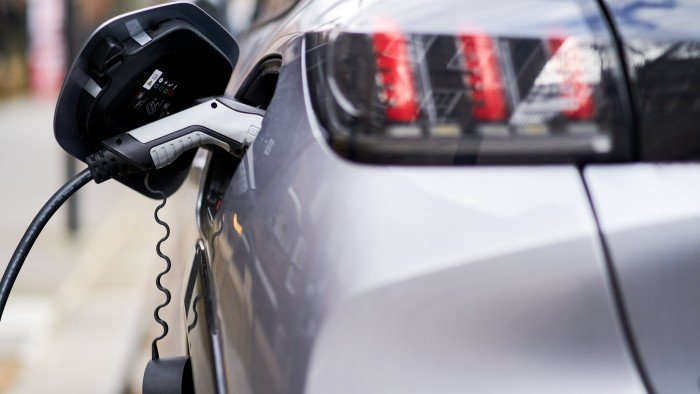Unlock the White House Watch newsletter for free
Your guide to what the 2024 US election means for Washington and the world
The UK government is watering down its targets for electric vehicles, with lower punitive fines, in order to support the domestic car industry after Donald Trump imposed a 25 per cent tariff on the global automotive sector’s exports to the US.
Sir Keir Starmer announced on Sunday that the 2030 phaseout date for new petrol and diesel cars will remain in place, but under the new plan manufacturers will be allowed to sell full hybrid and plug-in hybrid vehicles until 2035.
The move answers a call by automakers including Toyota and Nissan for an extension for hybrid vehicles, and follows a two-month consultation with the industry on the UK’s so-called zero emission vehicle mandate.
The UK prime minister also unveiled new flexibility in the targets by lowering the fine levels for each vehicle below the target, by £3,000 to £12,000 for cars and £15,000 for vans.
The change will also allow carmakers to sell more zero-emission cars in later years when ministers believe demand will be higher.
That means they will be given credit for making significant reductions in their own overall carbon emissions, which has benefited brands that sell large numbers of hybrids, until 2029 instead of 2026. They will also be allowed to trade credits between vans and cars.
The current scheme requires a certain percentage of each carmakers’ annual sales to be zero-emission vehicles, with the percentage annually rising from 28 per cent this year to 80 per cent in 2030. Sales of electric vehicles surged 43 per cent from a year earlier in March but the market share was still below the target at 19.4 per cent.
Small and “micro-volume” manufacturers, including McLaren, Lotus and Caterham, will meanwhile be granted an exemption, in a bid to protect British supercars and cutting-edge engineering.
Starmer said the package was being brought forward as a response to the way “global trade is being transformed” after Trump unveiled his new tariffs last week.
He heralded the “bold changes to the way we support our car industry” as an example of a government “that steps up, not stands aside” in the face of a shifting trade landscape.
Earlier on Sunday Starmer held calls with EU Commission chief Ursula von der Leyen, as well as Germany’s Chancellor Olaf Scholz and his incoming successor Friedrich Merz, about the latest US tariffs.
He said “Europe must rise to meet the moment and ensure the impact on hard-working people is minimised”, and stressed the UK wanted to strengthen its trading ties with allies, according to Downing Street.
Despite the changes, some car industry officials had hoped the new pressure from Trump’s tariffs would bring out stronger measures such as consumer incentives to boost EV sales.
Ford’s UK boss Lisa Brankin said the government’s response was “a small step in the right direction,” but added: “It is not the giant leap required to address the especially challenging electric vehicle market conditions”.
However, some EV advocates criticised the government decision to allow a longer life for hybrids. “Carmakers that continue to push this legacy technology risk becoming the Kodak of the car industry,” said Ginny Buckley, chief executive of Electrifying, the electric car buying and advice site.
The announcement came after Jaguar Land Rover said over the weekend it has suspended all shipments of cars to the US for a month, amid growing disruption to global automotive supply chains in the wake of Trump’s punitive levy.
The US tariff applies to all cars assembled outside America, bar partial exemptions for Mexico and Canada.
Energy secretary Ed Miliband, the most vocal green campaigner in the UK cabinet, is said by allies to be happy with the package, which he views as strengthening the existing commitment to ban the sale of new petrol and diesel cars from 2030.
Conservative shadow business secretary Andrew Griffith accused the government of performing a “U-turn” on its EV sales targets, but argued the moves did not provide sufficient support for UK carmakers.
Reiterating Tory leader Kemi Badenoch’s claim that achieving net zero by 2050 is “impossible”, Griffith added: “It would serve Britain well if that was Labour’s starting point, rather than these half-baked announcements which won’t make any difference.”
On Sunday, Starmer vowed to “use industrial policy to help shelter British business from the storm”, as he declared in The Telegraph: “The world as we knew it has gone.”




